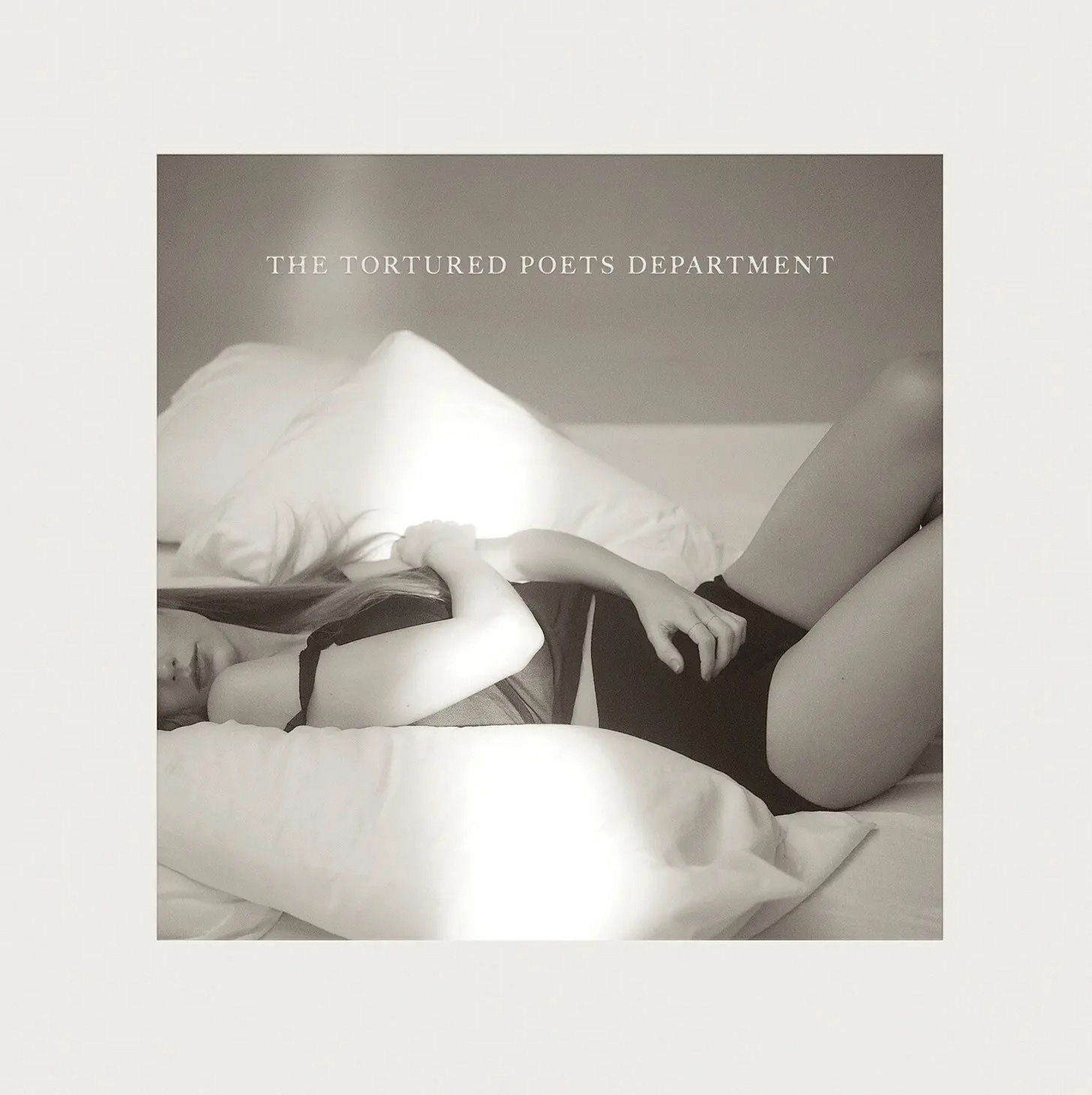Taylor's Torture 101
How to decide if Taylor Swift's latest album is good, bad, or just not for you
The only thing people can agree on about The Tortured Poets Department is that it’s polarizing. Some say it epitomizes Taylor Swift’s shortcomings while others defend it against criticism they find unfair.
As an opinionated 33 year old man whose allegiances to Swift are well documented, I thought I’d try to add some compassionate nuance to this discussion. Here are 10 questions to help you decide what to think about this album:
1. Do you already dislike her?
If so, I doubt this album will redeem her in your eyes.
Criticizing Swift is a pastime that’s increasingly unrelated to her music, anyway. Despite celebrities like Travis Scott, Jay Z, and Steven Spielberg all using their private jets more than her, only Swift received a public shaming campaign about her carbon footprint. Thanks to her, Fox News viewers finally acknowledged that carbon emissions are a problem, but only when they’re emitted by a famous woman.
2. Are you just tired of her being in the news?
Maybe you don’t hate her but are exhausted because, in 2023 alone she:
Began her heavily-documented, record-breaking Eras Tour, which became a theatrical film and streaming event.
Split with longtime boyfriend Joe Alwyn, briefly dated Matty Healy, controversial frontman of The 1975, then began dating Kansas City Chiefs tight end Travis Kelce.
Became a billionaire.
If any of the above bothered you, you likely won’t listen to this album anyway.
3. Do you enjoy her other music?
If you aren’t already a Swiftie, this won’t be the album to covert you.
The Tortured Poets Department (TTPD) lacks the infectious pop hooks of 1989 and echoes but doesn’t improve on the acoustic charm and Sad Dad sound of Folklore.
4. Do you believe that celebrities get to experience sadness?
“I Can Do It With a Broken Heart” is the most Taylor Swift song she’s ever written, about the challenges of touring during a breakup:
Lights, camera, bitch smile, even when you wanna die
He said he'd love me all his life
But that life was too short
Breaking down, I hit the floor
All the pieces of me shattered as the crowd was chanting, "More"
I was grinning like I'm winning, I was hitting my marks
'Cause I can do it with a broken heart
There are two common reactions to this:
Swift’s wealth & fame make her undeserving of sympathy. Her “woe is me” act has worn out its welcome, little more than “Champagne Problems” by this point in her career. Why is she still throwing a pity party?
Swift struggles with the same emotions as all of us, only amplified by the stress and scrutiny of fame. While we get to grieve in private, she must constantly put on a pretty face for the cameras. Why are we so eager to stop viewing celebrities as human beings?
My ten cents is that even extreme wealth doesn’t inoculate you against sadness, fame is its own form of public abuse that most of us can’t comprehend much less handle, and it’s very possible to be miserable and successful at the same time. TTPD is ultimately about unpacking these kind of uncomfortable contradictions.
5. Do you enjoy sifting through Taylor Swift’s emotional junk drawer?
“I Can Do It With a Broken Heart” embodies this album, opening up about her recent life with the emotional vulnerability and lyrical specificity that fans like me have long admired. At its best, the high points of TTPD like “The Black Dog” and especially “The Smallest Man Who Ever Lived,” capture the beautifully raw catharsis of songs like “Exile,” “Champagne Problems,” and “Tolerate It.” If, like me, you love listening to Swift fearlessly empty an Uzi clip full of heart-wrenching word play over an angsty bridge, you’ll find a lot to enjoy here. You won’t find any soaring anthems, however. Like a sad British pub, this album is full of Joe Alwyn and Matty Healy but bereft of bangers.
6. How much sonic variety do you need?
Like Reputation, this album’s strengths are how it explores and deftly dissects messy life transitions. However, like Evermore, they are at times overshadowed by sounding too much like its predecessors and itself. Many songs on TTPD share the same slow, dreamy tempo and lyrics full of half spoken, half sung confessions. To be clear, none of it is inherently bad, just the kind of inoffensive tracks you fall asleep to on a road trip. “The Smallest Man Who Ever Lived” may be the best song on the album, and belongs in my pantheon of the best bridges of all time, right next to the Golden Gate and “All Too Well.” Yet it’s swallowed up by a melancholy marsh of sonic sameness surrounding it. This album begins to vanish into the background as you’re listening to it, something producers Dessner and Antonoff could have and should have pointed out to their longtime friend and collaborator.
7. Were you waiting for songs about Travis Kelce or the state of Florida?
Behold “The Alchemy,” a salute to the Pro Bowl tight end. Kudos to Swift for choosing a tactful song title instead of “The Chief of My Heart” or “I Fly Him To Mahommes.”
My favorite song is “Florida!!!”, a duet with ginger forest spirit Florence Welch of Florence + the Machine. The ven diagram of Florence and Swift’s biggest fans is more than just me but I’m definitely near the center.
8. How do you feel about the lyric: “touch me while your boys play Grand Theft Auto?”
I ask because the internet appears to be losing its mind over this line. Your mileage may vary.
9. Do you believe in “too much of a good thing?”
Swift is as generous as she is prolific, releasing four albums in the past four years, creating a three hour long tour, and re-recording “Snow on the Beach” to include more Lana Del Rey after Swifties demanded it.
Her constant willingness to give is why people love and hate her. The very things fans celebrate like making The Eras Tour available in theaters and on streaming services or releasing a surprise double album are exactly what her critics point to to claim she has sold out, is overexposed, or has lost touch with the value of restraint.
In my opinion, it’s the latter critique that’s the most valid. TTPD loses both narrative clarity and a cohesive impact thanks to its marathon length. Swift’s generosity is admirable but sacrifices coherence for indulgence. Many of the later songs feel like baffling eddies, like “The Bolter,” which sounds like the first paragraph of a pretentious New Yorker profile:
“By all accounts, she almost drowned
When she was six in frigid water
And I can confirm she made
A curious child, ever reviled
By everyone except her own father”
There are few songs on the back half on TTPD: The Anthology besides “thanK you aIMee” (a charming ode to Kim Kardashian) that felt memorable or necessary.
Yet while this album’s volume may be for her fans, the content is clearly for Swift alone. She’s put her own emotional release above radio appeal and pop songwriting formulas for perhaps the first time in her career. I applaud her for sharing so much while also acknowledging with no malice that huge swaths of it were literally not for me.
10. Are you familiar with David Pumpkins?
The best advice on making sense of all this comes from a long-lost SNL skit.
In it, Kate McKinnon and Beck Bennett embark on a theme park ride in the style of Disney’s Tower of Terror, guided by always pitch perfect Keenan Thompson. There, they encounter Tom Hanks in a gaudy orange pumpkin suit, playing a confusing and decidedly non-scary Halloween character, dancing awkwardly alongside two skeletons.
While this zany sketch was cut for time, it’s since developed a cult following. It’s also a parable about making art.
SNL writers prepare 40-50 sketches weekly but only use 8 per episode. Writing for SNL means knowing that much of your hard work will get cut. While choosing what to keep is always subjective and imperfect, trimming the weaker skits, even darling ones like David Pumpkins, is essential to making a good show.
The paradox of the Extended Editions of The Lord of the Rings trilogy is that while many of the new scenes are great for character development, comedic relief, and fan service, almost none of them meaningfully advance the story. Watching them is as charming as cutting them was obviously necessary.
The takeaway is the same.
Avoiding tough creative tradeoffs just results in another tradeoff.
Even the cutest trinkets still clutter a room.
Which brings us back to David Pumpkins and The Tortured Poet’s Department.
After finding out that 73 out of 100 floors include David Pumpkins, an irritated Beck asks:
“Why did you go all in on David Pumpkins?”
To which Thompson responds: “It’s 100 floors of frights, they’re not all gonna be winners.”
If you enjoyed reading this and want to support more content like this please, consider becoming a subscriber. A free or paid subscription is a great way to support my writing and ensures you’ll never miss a post.
Do you know someone that would enjoy this article? Share it with them!
Do you love Taylor Swift? Hate her? What’s your favorite song on The Tortured Poets Department?


